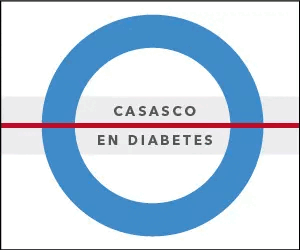Epidemiological, psychosocial and therapeutic vision of diabetes mellitus in Argentina from the perspectives of health team and people with diabetes
DOI:
https://doi.org/10.47196/diab.v56i1.518Keywords:
unsatisfied needs, quality of care, adherence to treatment, accessibility, medications and suppliesAbstract
Introduction: diabetes mellitus (DM) generates a heavy socioeconomic burden, and to address it, it is necessary to investigate its possible conditioning factors to achieve effective control, prevention, and treatment.
Objectives: to understand the problem of diabetes in Argentina, from the perspective of health professionals and people with DM and the strategies to improve it.
Materials and methods: it was implemented a descriptive study with qualitative methodology based on the metaplan technique. A questionnaire was designed with two questions (What are, in your opinion, the problems faced by diabetes in our country?, What strategies would you use to solve them?), which was distributed to health professionals and people with DM via the Internet of their respective Societies during JuneJuly 2021. The participants (adults, residents of Argentina) had to answer up to 4 alternatives in each question. All the responses received were reviewed, grouped by topic and analyzed/ quantified using descriptive techniques, expressing the results as percentages.
Results: the final sample included 404 professionals from the health team and 272 people with DM: mostly with type 1 DM. The analysis shows that there is: a) a poor organization of coverage; b) a predominance of unhealthy habits; c) scarce provision of structured diabetes education, which makes it difficult to diagnose and adequately treat, and train patients to participate actively and efficiently in the control and treatment of their disease; d) there is a deficient quality of care.
Conclusions: our results, similar to those obtained in other countries, suggest that the solution strategies would go through the restructuring of medical training, achieving a harmonious balance between the primary level of care and the specialties, adding a decrease in the psychological burden of the patient. It would be facilitated by the harmonious cooperation of educational institutions and scientific societies. Likewise, through a consensual intervention of different sectors of society.
References
I. International Diabetes Federation. IDF Diabetes Atlas. 10th edition, https://diabetesatlas.org; 202021 [acceso diciembre 2021].
II. Chew BH, Vos RC, Metzendorf MI, Scholten RJPM, Rutten GEHM. Psychological interventions for diabetes-related distress in adults with type 2 diabetes mellitus. Cochrane Database of Systematic Reviews 2017, Issue 9. Art. No.: CD011469
III. 4° Encuesta Nacional de Factores de Riesgo. Resultados definitivos. Octubre de 2019. Instituto Nacional de Estadística y Censos (INDEC) - Secretaría de Gobierno de Salud de la Nación. ISBN 978-950-896-554-7.
IV. Elgart JF, Asteazaran S, De La Fuente JL, Camillucci C, Brown JB, Gagliardino JJ. Direct and indirect costs associated to type 2 diabetes and its complications measured in a social security. Int J Public Health 2014; 59:851–857
V. Alberti G: The DAWN (Diabetes Attitudes, Wishes, and Needs) study. Pract Diabetes Int. 2002; 19:22–24.
VI. Gopisetty D, Levine B, Liu N, Younge Phj, Brown A, et al. How Does Diabetes Affect Daily Life? A Beyond-A1C Perspective on Unmet Needs. Clin Diabetes J. 2018; 36 (2):133-137
VII. Wylie TAF, Shah C, Connor R, Farmer AJ, Ismail K et al. Diabetes UK Position Statements. Transforming mental well-being for people with diabetes: research recommendations from Diabetes UK’s 2019. Diabetes and Mental Well-Being Workshop. Diabetic Medicine. 2019; 36, 1532–1538.
VIII. Schnelle, E. (1979). The Metaplan-method: Communication Tools for Planning and Learning Groups. Metaplan-GmbH
IX. Veiga-Seijo S, Movilla-Fernández MJ, Rivas-Quarneti N. Scoping Review sobre el Metaplan como Metodología de Investigación Cualitativa en Ciencias de la Salud. New Trends in Qualitative Research. 2020; 3:1000–1007. doi.org/10.36367/ntqr.3.2020.1000-1007
X. Elgart JF, Prestes M, Gonzalez L, Rucci E, Gagliardino JJ, for the QUALIDIAB Net study group. Relation between cost of drug treatment and body mass index in people with type 2 diabetes in Latin America. PLoS One. 2017; 12(12): e0189755
XI. Herman WH, Ye W, Griffin SJ, Simmons RK, Davies MJ, Khunti K, Rutten GEHM, Sandbaek A, Lauritzen T, Borch-Johnsen K, Brown MB, Wareham NJ. Early Detection and Treatment of Type 2 Diabetes Reduce Cardiovascular Morbidity and Mortality: A Simulation of the Results of the Anglo-Danish-Dutch Study of Intensive Treatment in People With Screen-Detected Diabetes in Primary Care (ADDITION-Europe). Diabetes Care. 2015; 38(8): 1449–1455
XII. Sereday M, Damiano M, Lapertosa S. Chronic complications in patients with newly diagnosed type 2 diabetes. Endocrinol Nutr. 2008;55(2):64-8.
XIII. Prestes M, Gayarre MA, Elgart JF, Gonzalez L, Rucci E, Paganini JM, Gagliardino JJ. Improving diabetes care at primary care level with a multistrategic approach: results of the DIAPREM programme. DIAPREM (DIAbetes Primary Care, Registry, Education and anagement). Acta Diabetol. 2017; 54 (9):853.
XIV. Gagliardino JJ, Elgart JF, Forti L, Querzoli I, Chantelot J-Marc Type 2 diabetes: Prescription patterns and treatment outcomes of IDMPS survey in Argentina. Diabetes Res Clin Practice. 2019; 153:86-92.
XV. Gagliardino JJ, de la Hera M, Siri F; Grupo de Investigación de la Red QUALIDIAB. Evaluación de la calidad de la asistencia al paciente diabético en América Latina. Rev Panam Salud Publica. 2001;10(5):309-17).
XVI. Saddinne JB, Cadwell B, Gregg EB, Engelgau MM, Vinicor F, Imperatore G, Narayan KMV. Improvements in diabetes processes of care and intermediate outcomes: United States, 1988–2002. Ann Intern Med. 2006; 144:465–474.
XVII. Skovlund SE, Peyrot M, on behalf of the DAWN International Advisory Panel: The Diabetes Attitudes, Wishes, and Needs (DAWN) program: a new approach to improving outcomes of diabetes care. Diabetes Spectrum. 2005; 18:136–142.
XVIII. Peyrot M, Rubin RR, Lauritzen T, Snoek FJ, Matthews DR, Skovlund SE: Psychosocial problems and barriers to improved diabetes management: results of the cross-national Diabetes Attitudes, Wishes, and Needs study. Diabet Med. 2005; 22:1379–1385.
XIX. Peyrot M, Rubin RR, Siminerio L, on behalf of the International DAWN Advisory Panel: Physician and nurse use of psychosocial strategies in diabetes care: results of the cross-national Diabetes Attitudes, Wishes, and Needs study. Diabetes Care. 2006; 29:1256–1262.
XX. Rubin RR, Peyrot M, Siminerio L, on behalf of the International DAWN Advisory Panel: Health care and patient-reported outcomes: results of the cross-national Diabetes Attitudes, Wishes, and Needs study. Diabetes Care. 2006; 29:1249–1255.
XXI. Peyrot M, Rubin RR, Lauritzen T, Skovlund SE, Snoek FJ, Matthews DR, Landgraf R, International DAWN Advisory Panel: Patient and provider perceptions of care for diabetes: results of the cross-national DAWN study. Diabetologia. 2006; 49:279–288.
XXII. Biernatzki L, Kuske S, Genz J Ritschel M, Stephan A, Bächle Ch, Droste S, Grobosch S, Ernstmann N, Chernyak N and Icks A. Information needs in people with diabetes mellitus: a systematic review. Syst Rev. 2018; 7: 27.
XXIII. Chan JCN, Lim LL, Wareham NJ, Shaw JE, Orchard TJ, Zhang P, Lau ESH, Eliasson B, Kong APS, Ezzati M, Aguilar-Salinas CA, McGill M, Levitt NS, Ning G, So WY, Adams J, Bracco P, Forouhi NG, Gregory GA, Guo J, Hua X, Klatman EL, Magliano DJ, Ng BP, Ogilvie D, Panter J, Pavkov M, Shao H, Unwin N, White M, Wou C, Ma RCW, Schmidt MI, Ramachandran A, Seino Y, Bennett PH, Oldenburg B, Gagliardino JJ, Luk AOY, Clarke PM, Ogle GD, Davies MJ, Holman RR, Gregg EW. The Lancet Commission on diabetes: using data to transform diabetes care and patient lives. Lancet. 2021 Dec 19;396(10267):2019-2082. doi: 10.1016/S0140-6736(20)32374-6. Epub 2020 Nov 12
XXIV. Gagliardino JJ. Diabetes mellitus: ¿es tan sólo un problema de salud pública? ¡Uno para todos y… todos para uno!. Rev ALAD. 2018; 8(2):55-56.
Downloads
Published
How to Cite
Issue
Section
License
Copyright (c) 2022 on behalf of the authors. Reproduction rights: Argentine Diabetes Society

This work is licensed under a Creative Commons Attribution-NonCommercial-NoDerivatives 4.0 International License.
Dirección Nacional de Derecho de Autor, Exp. N° 5.333.129. Instituto Nacional de la Propiedad Industrial, Marca «Revista de la Sociedad Argentina de Diabetes - Asociación Civil» N° de concesión 2.605.405 y N° de disposición 1.404/13.
La Revista de la SAD está licenciada bajo Licencia Creative Commons Atribución – No Comercial – Sin Obra Derivada 4.0 Internacional.
Por otra parte, la Revista SAD permite que los autores mantengan los derechos de autor sin restricciones.

































